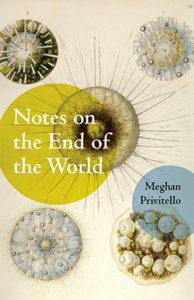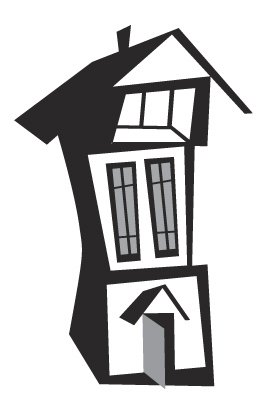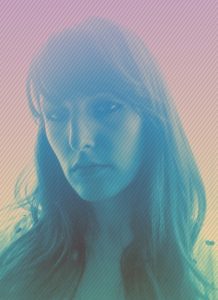 Book Title, Press, Year of Publication:
Book Title, Press, Year of Publication:
Notes on the End of the World, Black Lawrence Press, 2016
Synopsis: A sequence of poems that count down or count towards the end of the world.
What do you think makes your book (or any book) a “project book”?
I think my book is a project book because it was written with the intention of being a notebook or journal left behind by the speaker after the world ended/the speaker died, giving it a singular hyperfocus/purpose. Each poem is preoccupied with how the world will be or appear as it ends.
Why this subject (or constraint)?
When I started writing these End of the World poems five years ago, I don’t know that I necessarily thought the physical world was ending, but was rather feeling something like an emotional apocalypse – a gradual and personal breakdown of hope. Just as the poems were a counting towards the end of the world, they were also working towards an acceptance of the mind, sometimes, wanting to give up. If I had started writing this book today, I would absolutely think the world was ending, or that it has ended and we are now living in its stinking glow. The poems in Notes on the End of the World were certainly not prophets of the world today. Now, they seem almost sweet.
How important was it for you that each poem could “stand on its own” or that the poems should rely on other poems in the book, or on the premise of the project itself, to succeed? What challenges did this present for you when writing single poems or structuring the book overall?
When I started writing these poems, I did not write with the intention of the poems being able to stand alone. The end of the world was a container I wanted to fill with the lines and images and questions I had floating around in my head. I just kept stuffing these fragments into the container until it was (or felt) full. In this way, the poems do rely on each other in that the idea doesn’t feel “complete” or “full” if they are standing on their own. This didn’t present a problem to me as I was writing or structuring the book, but after I was finished I felt a challenge when submitting these poems to journals. I always felt like I was offering a broken-off piece of a thing. Or, when I read from the book for the first time at a reading, I felt like the poems I read had an echo of space around them where all the other poems should be. Sometimes, I wish each poem had its own legs to stand on, but accept that they couldn’t have been any other way (I think I’m beginning to sound motherly!).
Did you fully immerse yourself in writing this project book, or did you allow yourself to work on other things?
I was fully immersed in writing Note on the End of the World. I wish I could say I was the type of person who could work on ten projects at once. The reality of it is, my mind has only enough focus to immerse itself in one project at a time. That time is a time of intense obsession, which allows me to be fairly productive in a short-ish amount of time. Then, once I’m done, I’m done. It’s like my mind shuts down completely, lights out, does not associate itself with the project at all, as if all of it never happened.
Did you ever lose momentum, bore yourself, or worry that your project could not be sustained for a full-length book? How did you push through?
I had originally planned for Notes on the End of the World to be my first full-length book. It was the first cohesive group of poems I had ever worked on. When my creativity and drive started to lose steam, I let the poems stop. At that point, I did have the minimum number of pages for a full-length book, but decided to step away from it for what I thought would be a few weeks, to let the poems breathe into themselves and me to breathe out the weight of creative output. Those few weeks turned into a few years. I had not, until that point of returning to the project with fresh eyes, ever considered making it into a chapbook. After cutting the poems I thought were weaker, or that didn’t add to the arc of the book, it seemed as if it could never have been anything but a chapbook. Pushing through to make it full-length felt disingenuous, and writing insincere poems for the sake of meeting a page requirement is too icky to ever consider.
As a reader, are you drawn to project books? What project books have influenced you or have you enjoyed, and what do you think makes those books successful?
I’m drawn to and completely fascinated by project books because they require such a sustained hope and mad obsession to create, something I have a hard time cultivating. I also think my definition of project book is pretty loose. For me, pretty much any book that seems as if it was conceived of as a whole rather than an eventual sum of parts falls into the category of project book. Some that come to mind are Claudia Cortese’s Wasp Queen, Elisa Gabbert’s L’Heure Bleue, or the Judy Poems, Theresa Hak Kyung Cha’s Dictee, Mathias Svalina’s Destruction Myth (or really any of his books), CA Conrad’s The Book of Frank, Gabrielle Calvocoressi’s The Last Time I Saw Amelia Earhart, Rebecca Lindenberg’s Love, an Index, Catie Rosemurgy’s The Stranger Manual, Alice Notley, Anne Carson, ah!, and so many more. I don’t consider the success of these books in relation to their being project books. These are all books that have either made me cry, made me feel like a monster, made me feel like a human, made me see the world with wonky eyes, made me say “I have wasted my life,” made me believe in authentic magic, or some combination thereof.
After completing a project, how did you transition into writing something new? What are you working on now? Another project?
Generally, I go through a barren period. I don’t write anything, not even notes or fragments. No thinking towards something new. A complete and total removal from the idea of “making.” Up to this point, new projects have built on themselves naturally, almost as if I looked into a window of a weird little shack and observed the thing growing as an outsider. Then comes the official a-ha! moment, recognizing the potential in the weird scattering of images and ideas, followed by tremendous excitement, and then the clean, deep, and breathless dive into the project. This is what happened with my most recently completed project, a full-length manuscript called One God at a Time. It was the most joyful writing experience I’ve had yet. It’s been almost a year since I finished it, and this barren period feels more frightening than the others. Maybe because I fear I will never feel that joy again. I’ll go ahead and blame that fear, and all forthcoming fears, on Trump.
What advice can you offer other writers, particularly emerging writers or poetry students who may be using the project book as a guiding principle for their own work?
Uh oh, I am generally not an advice giver for anything writing-related because I could use a Poetry Therapist most of the time. I can say that the frame of a project book was a godsend for me at a time when I felt completely lost in how to start writing a book. I had only written completely disparate poems before starting Notes on the End of the World, and the project book was a delicious and necessary Xanax that allowed me to loosen the grip I had on myself and the struggle I had when trying to move into the idea of something bigger than single poems. I say to use whatever the fuck you need in order to write. There remains a bit of a stigma around the idea of project books, that somehow they are “an easy way out.” I think that is absolute bunk, and no one, writer or otherwise, has the right to tell someone they’re not making art the right way. We all need guidance, whether it is through a community of writing peers, through stacks of books by our most beloved writers, or through a structural framework that allows ideas the space to mutate and grow. So whether you use the project book or a stone or a steak dinner as a guiding principal for your work, it doesn’t matter, it doesn’t make it any more or less, it just makes it happen. Just make it happen.


